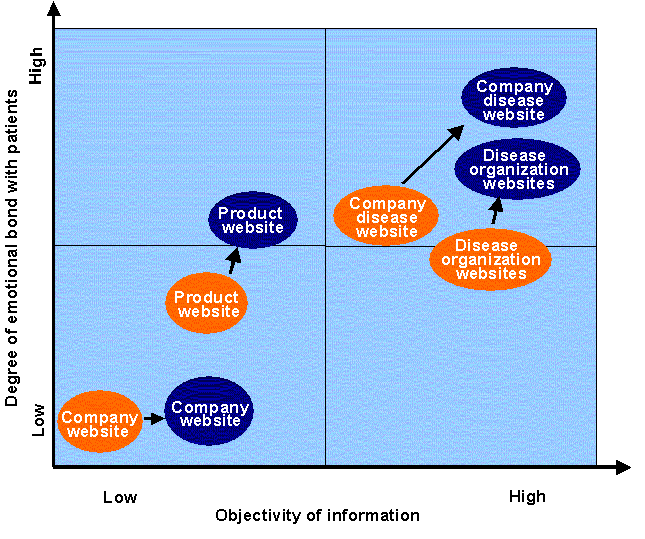DTC marketing: Pharmaceutical companies not exploiting the Internet

Despite being the fastest growing medium in history, the use of the Internet is only at an embryonic stage in the pharmaceutical industry. In the context of direct-to-consumer (DTC) marketing, pharmaceutical companies are not using the Internet to its full potential, instead focusing on brand building through product based websites.
Datamonitor's new report, DTC Marketing 2001: Converting Patient Awareness into Drug Prescriptions in the US and Europe, reveals:
- Pharmaceutical companies are not capitalizing on the power of the Internet to build long term relationships
- Brand promotion on the Internet is not an efficient DTC investment
Pharmaceutical companies are not capitalizing on the power of the Internet to build long term relationships
Traditional media, such as television, print and radio, are by their nature usually limited to communicating a one-way message to a passive receptor. In contrast, the Internet can bring DTC marketing to an interactive level, creating a dialogue between patients and pharmaceutical companies. Ultimately, this can develop into a one-to-one relationship, where patients receive information tailored to their needs and specific conditions.
Building relationships with patients is a formidable source of consumer information for pharmaceutical companies. If companies succeed in providing patients with the information they are looking for, in terms of depth of content, accuracy and objectivity, this will in turn improve the trust patients have in a company and its website. If pharmaceutical companies can also provide personalized health solutions and support via the Internet, this will increase the likelihood of patients demanding its products and lead to increased sales.
However, at the moment, there are only a few companies that have fully realized the potential of the Internet in DTC marketing. Datamonitor believes that AstraZeneca's gut-reaction website (www.gut-reaction.co.uk) is a good example for other pharmaceutical companies to follow both in Europe and in the US. It represents a valuable source of objective information on gastro-esophageal reflux disease, where patients can learn about disease symptoms, conduct an online self-assessment, view all available treatments, and gain support through patient and experts forums.
Philippe Fabre, Datamonitor Analyst, comments: "Rather than promote brands, the ideal consumer website should provide patients with a wide range of interactive services, helping to build strong and profitable relationships between patients and pharmaceutical companies."
Brand promotion on the Internet is not an efficient DTC investment
Datamonitor's primary research with advertising agencies shows that pharmaceutical brands can be promoted most effectively through traditional media, such as television, print and radio. In contrast, consumers see the Internet as an educational tool and have an aversion to commercial pharmaceutical websites. This makes it extremely difficult for pharmaceutical companies to build and develop their brands over the Internet.
Despite this, pharmaceutical companies mainly offer a multitude of product based websites with little objective information offered to patients. Although product based websites can be a source of health information for consumers, their content is mainly concentrated on the presentation of a product's attributes and benefits, and other pharmacological and non-drug treatment options are rarely detailed. Similarly, brand promotion through the sponsorship of disease organization websites is not effective either. To be effective, Datamonitor believes that websites must provide a high degree of objectivity combined with emotional value. Therefore, company disease websites, which are focused on a particular disease and not on a product, are very attractive to patients due to their greater objectivity, and help to create an emotional bond with patients.
The following diagram benchmarks the different websites that can be used for DTC marketing according to their emotional and rational value for patients. Consumers want to have access to detailed information that is highly accurate and objective.

For further information, please contact Elisabeth Overend-Freeman at efreeman@datamonitor.com . DTC Marketing 2001: Converting Patient Awareness into Drug Prescriptions in the US and Europe is available from Datamonitor, priced at $5,800.
Datamonitor is an independent market analysis firm that publishes a wide portfolio of strategic business information. Datamonitor has expertise in the following industry sectors: Automotive & Transport; Consumer; Financial Services; Healthcare; Industrial; Medical Devices; Technology. Datamonitor can be contacted at 212-686-7400 or visit www.datamonitor.com.
Source: Datamonitor
Subscribe to our free e-mail newsletter.
Click for a free Buyer's Guide listing.
